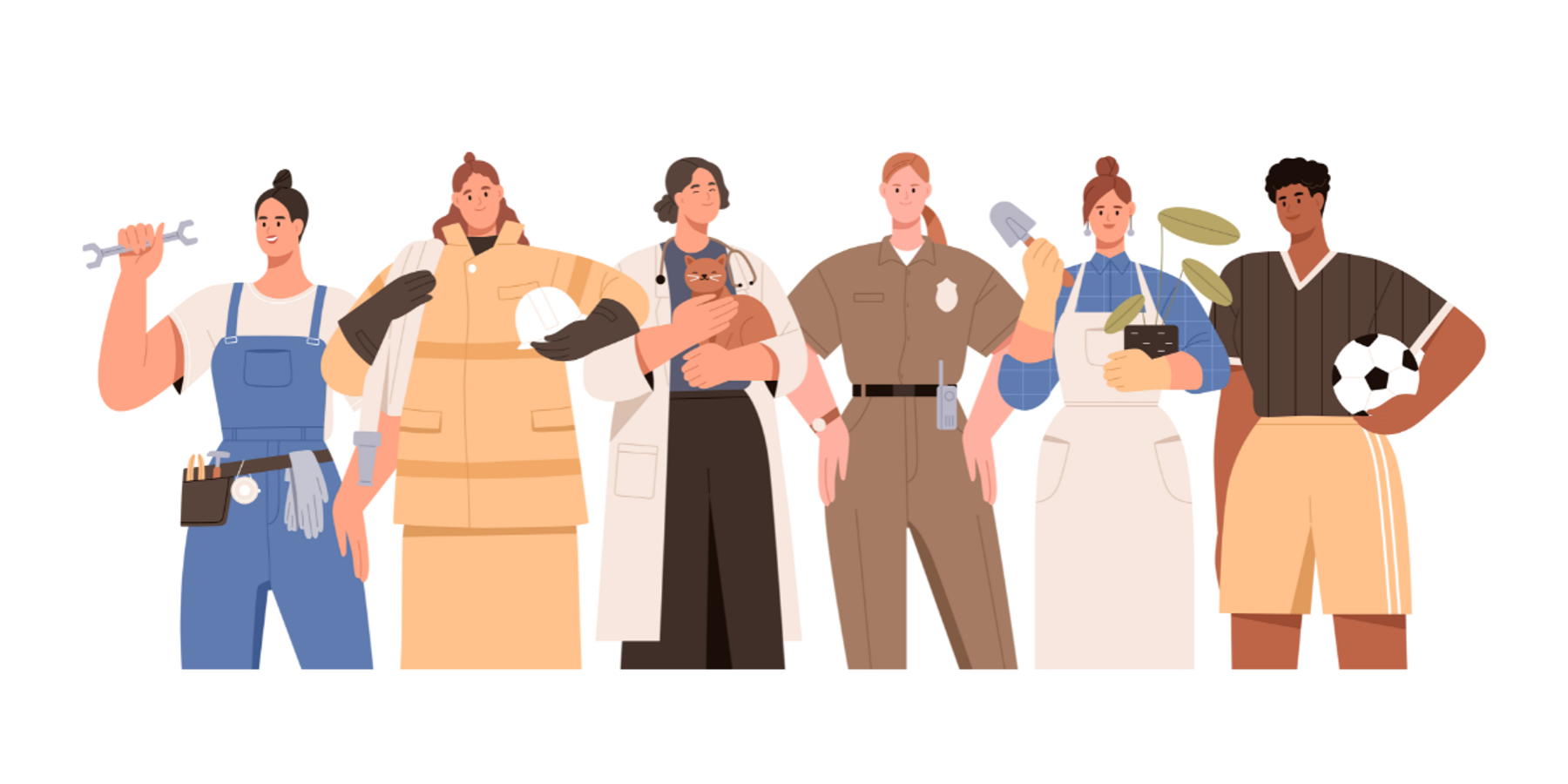Have you ever seen professionals, maybe online, maybe at your own office, who are able to inspire their teams to success, resolve issues amicably, and connect with others? How is it so effortless for them? Is it pure charisma? Short answer is…of course not! While these skills may come naturally to some people, ultimately it’s their people skills — an essential set of abilities that allow people to collaborate well with others in both leadership and team settings — that hold the key to their success. People skills are more important than ever in a world where automation, remote work, and international collaboration are becoming the standard. These skills allow you to not only maximize output but also foster stronger relationships.
People skills are one of the key learning pillars here at PowerToFly. These skill sets, which are also sometimes known as soft skills, are really just synonyms for interpersonal skills, which are vital for promoting meaningful connections at work. But what exactly are people skills, and why are they so important for your career success? Let’s explore the importance of people skills, how they can advance your career, and how to best highlight them on your LinkedIn profile and resume.
What are people skills?
Simply put, people skills are the abilities that enable you to collaborate and engage effectively with others. They cover a broad spectrum of interpersonal skills, such as leadership, teamwork, communication, empathy, emotional intelligence, and conflict resolution. These competencies are critical for developing relationships, recognizing and regulating emotions, and promoting beneficial and harmonious interactions in personal as well as professional settings.
People skills are useful in the workplace because they enable professionals to collaborate effectively with colleagues, handle challenging situations professionally, and adjust to a variety of social contexts. People skills are essential in all employment roles and industries, from the CEO managing a huge international business to an entry-level worker providing customer care.
Key components of people skills
- Communication: The ability to clearly express ideas, actively listen, and engage in meaningful conversations.
- Emotional intelligence: Being able to identify, check, and influence your own feelings as well as those of others.
- Empathy: Recognizing and connecting to the thoughts, emotions, and perspectives of others.
- Conflict resolution: Handling conflicts in an effective manner and coming up with solutions that satisfy all parties.
- Teamwork: Collaborating efficiently with others to accomplish a common goal.
- Leadership: Guiding and motivating a team toward common goals.
Why are people skills so important?
Today’s workplace sees technology and artificial intelligence automating many tasks, but people skills continue to be in high demand. According to LinkedIn's 2020 Global Talent Trends research, 92% of talent professionals and recruiting managers believe that soft skills are equally, if not more significant than hard skills when recruiting talent.
While technical (or "hard skills") may get you in the door, people skills are what helps you succeed in the workplace. Whether you're a team leader, a professional cooperating across departments, or someone newly starting out in their career (or all three and more!), people skills will help you develop genuine connections, foster trust, and positively contribute to your organization's culture.
The benefits of people skills in the workplace
Boosts collaboration and teamwork
People skills allow you to collaborate smoothly with people by fostering mutual respect and open communication. In team settings, these abilities guarantee that everyone is heard, contributions are acknowledged, and disagreements are resolved productively.
Helps in conflict resolution
Every workplace experiences conflict, whether it be due to personality differences, work styles, or decision-making. People skills, particularly communication and empathy, are useful in mediating conflicts and finding solutions that benefit all parties involved.
Enhances leadership
Leaders with excellent interpersonal skills can motivate and inspire their staff. Empathy and emotional intelligence are vital for leaders to understand their team members' goals and issues, which leads to increased employee engagement and productivity.
Builds positive work relationships
Positive relationships at work are integral to long-term success. Professionals with outstanding people skills are more likely to establish trust with their coworkers, managers, and clients, which leads to stronger collaboration and networking opportunities.
Increases productivity
When everyone is communicating clearly and addressing problems effectively, you can eliminate most ambiguities and work delays. Teams that communicate effectively tend to perform better, meet deadlines, and achieve their objectives more frequently.
How to highlight people skills on your resume or LinkedIn profile
Let’s get to the good stuff. The workforce is currently swinging heavily towards a skills-based economy, which means that highlighting your skills effectively is the one of the best ways to find your dream gig. Having excellent people skills is key, but demonstrating them adequately on your resume or LinkedIn page is just as important. Here's how you might employ (sorry) people skills to impress recruiters and employers:
Use action-oriented language
When explaining your experience, highlight how you employed people skills to attain a certain goal. For example:
- "Led cross-functional teams to deliver a 15% increase in project efficiency by improving communication and collaboration between departments."
- "Resolved customer complaints by applying active listening and empathy, resulting in a 30% improvement in customer satisfaction."
Highlight specific skills in your skills section
Add people skills in your "Skills" section on LinkedIn or your resume, but be accurate and specific where you can. Avoid generic terms like "good communicator" and instead use terms that are relevant to what employers are seeking, such as "conflict resolution," "emotional intelligence," and "team leadership."
Quantify your impact
Numbers matter for soft skills too! When possible, offer metrics to demonstrate the outcomes of employing your people skills. For example:
- "Increased team engagement by 20% through effective conflict resolution and team-building initiatives."
- "Mentored five new employees, contributing to a 50% reduction in onboarding time."
Tailor your resume for each job
We know it can be a pain, but it’s worth it! Evaluate the job description and identify the people skills that are most relevant to the role. Customizing your resume ensures that you highlight the people skills that are most relevant to the company.
Examples of people skills in action
All that’s fine and good, but let’s talk about some practical applications of people skills in a few different industries:
- Sales and marketing: Building client relationships, recognizing customer demands, and negotiating deals all require excellent people skills.
- Technology: While technology is frequently thought of as a hard skill, the tech sector also requires people skills for efficient team cooperation, client management, and project team leadership, particularly in the startup phase.
- Healthcare: To provide outstanding patient care, doctors, nurses, and other healthcare professionals must possess empathy, emotional intelligence, and clear communication skills.
- Education: People skills are used practically every minute of every day by educators, trainers, and teachers to keep students engaged, run their classrooms, and interact with parents and administration in a productive way.
How people skills training can help
Good people skills don’t just appear on their own, they require effort and dedication to develop. Training your people skills can help with this, and there are quite a few resources available on an enterprise or individual level (including PowerUp!) that provide training programs intended to assist individuals in growing and improving their people skills.
People can do a personal skills audit using our SkillMeter tool, which enables you to pinpoint areas for development and target certain training courses that correspond with your professional objectives. Whether you're brand new in your field or seeking to enhance your leadership skills, investing in people skills training can pay off in the long run by helping you advance both personally and professionally.
So…what now?
Even in a world that is becoming more computerized and automated, having people skills is still key to professional success. Maybe especially now, as these are the skills hardest to replicate through automation. These skills play a vital role for professionals in all fields, from fostering leadership and dispute resolution to improving cooperation and communication. You can enhance your productivity, progress your career, and cultivate better relationships at work by developing and demonstrating your people skills.
One of our favorite missions at PowerToFly is to support people in acquiring and improving their people skills. We’re constantly developing resources and training to assist you in taking charge of your career and thriving in the cutthroat job market through our skills framework and solutions like SkillMeter.
Are you ready to level up your people skills? Begin your journey toward mastering these essential people skills and get ready for long-term success!









